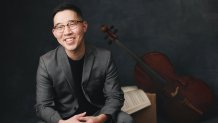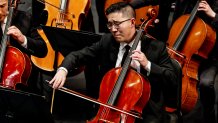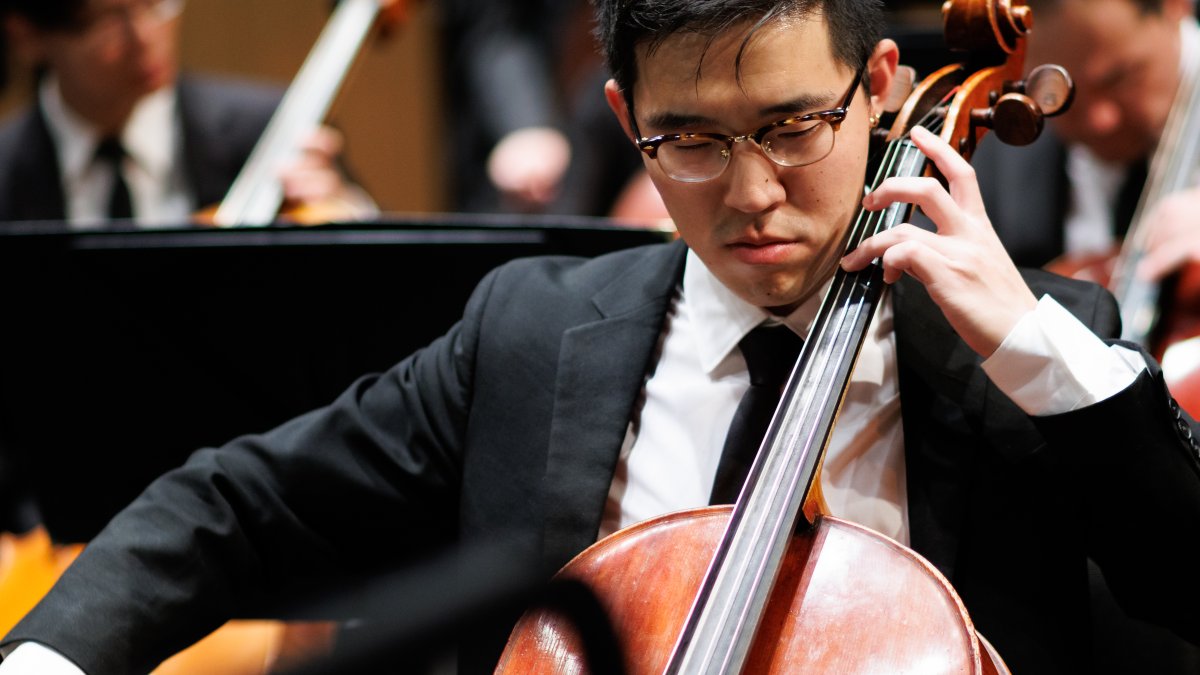As the Dallas Chamber Symphony begins its new season, it welcomes a newly appointed principal cellist, Eunghee Cho. Cho will perform at the season opening concert featuring internationally acclaimed pianist Anton Nel on October 14 at the Moody Performance Hall in the Dallas Arts District.
The Korean American cellist might owe his musical ambitions to his sister. Born in Davis, California, he started playing the piano at age five, but he developed an interest in the cello at age eight after his sister began playing the violin.
“I was always the younger sibling that wanted what she had, but slightly better,” Cho said. “Seeing my sister play the violin made me want to do something similar.”
In college, he was studying biology and music, with the intention of going to medical school and becoming a doctor. His first graduate teacher suggested Cho consider a different path.
“He kind of convinced me that, ‘Why don’t you give music a really serious shot where you’re not trying to juggle two workloads and come to Boston, study with me and if you decided after 2 years that this is not for you or if you feel the workload is too different than what you expected, then go back and apply for med school,” Cho said.
The 1989 film Dead Poets Society made him rethink what he wanted to do with his talents when Robin Williams’ character John Keating talked about the importance of poetry.
“Medicine, law, business, engineering, these are all noble pursuits, and necessary to sustain life. But poetry, beauty, romance, love, these are what we stay alive for.”
“It’s sound cheesy, but it really resonated with me,” Cho said. “Only one person can say what you say as an artist.”
Cho went on to complete Master of Music and Doctor of Musical Arts degrees at New England Conservatory under the tutelage of distinguished pedagogues Laurence Lesser and Paul Katz. He was awarded Second Prize and the special award for Outstanding Chinese New Piece Performance at the Schoenfeld International String Competition (China). Cho also received top prizes at the Chamber Music Yellow Springs Competition (USA), the Gustav Mahler Prize Cello Competition (Czech Republic), and the AEMC International Chamber Music Competition (Italy).

Claire McAdams
Claire McAdams
Cho currently teaches cello at the Moores School of Music at the University of Houston.
Cho is the cellist of Trio Magnoliana, principal cellist of Mercury Chamber Orchestra in Houston, and Director of Chamber Music for the Texas Music Festival. He currently teaches cello at the Moores School of Music at the University of Houston, where he also directs the Moores Cello Ensemble and CelloFest Houston. His students interact with students of various disciplines, and he believes their education is richer for it.
“It’s the kind of education I find to be so relevant to what musicians need to know how to do and know how to communicate,” Cho said. “Knowing how to navigate being this modern musician is something I’m really excited to be a mentor for.”
Cho dabbles in arranging. He started creating arrangements in high school for friends who played a variety of instruments. It became a more professional endeavor when he began arranging for his cello quartet.
“If I wanted to just satisfy my soul, I would program all these strange contemporary works, but I know that’s not strategic for audiences,” Cho said. “So, I would incorporate a jazz tune people would recognize, Autumn Leaves, or a pop tune people know. I like doing that for the cello quartet.”
Playing with an orchestra was not his career focus. Symphony orchestras have cello sections consisting of a dozen cellists. He prefers playing with a chamber orchestra like Dallas Chamber Symphony, which has a cello section of six.
“I find that my voice is so much more significant in that setting and you get to play the repertoire like Beethoven No. 7, which we’re playing October 14, in that context,” Cho said. “My focus in life has always been chamber music. That’s the reason why I play cello because of these intimate collaborations, and I would be very happy if that were my whole life. Dallas Chamber Symphony allows that intimacy of the small group where I can interact with individual player of the orchestra while still playing this incredible symphonic repertoire. And I love the people. Everyone is such a kind person in the orchestra.”
He sums up his main job as principal cellist.
“Practice the cello part just a little more than the rest of the cello section,” Cho said. “My preparation for it needs to be the highest level of anyone in the section.”

Mitch Lazorko
Mitch Lazorko
Cho leads the cello section during Dallas Chamber Symphony concert.
Watching the conductor and concertmaster is another key aspect of leading the section. He values the open communication and collaboration Richard McKay, the orchestra’s artistic director and conductor, fosters within the orchestra. He conveys what the section needs to do within the orchestra with his body.
“It involves a much more physical way of playing,” Cho said. “When there are moments that require particular ensemble precision, then my role is to show that in a way that is more universal for cellists so that there’s no room for individual interpretation.”
Through his teaching and performing with various chamber groups, Cho has crafted a music career that is in harmony with his purpose and passion.
“I do simply enjoy life because everything I do is what I want to do and I see the reasons why I should be doing these things,” Cho said.
Learn more: Dallas Chamber Symphony

